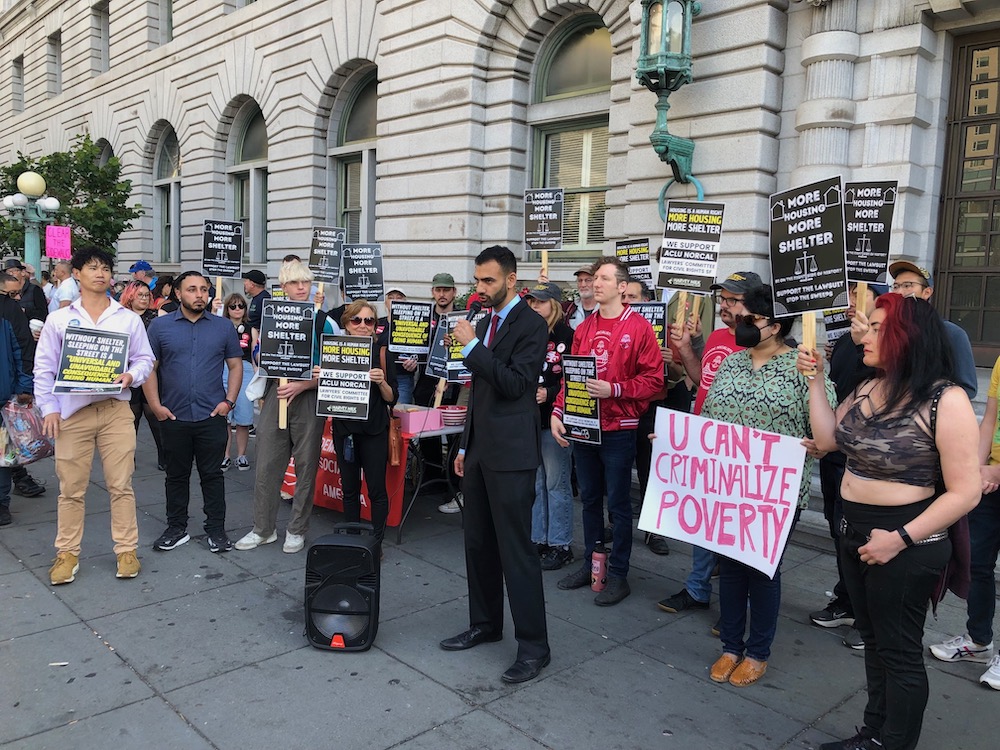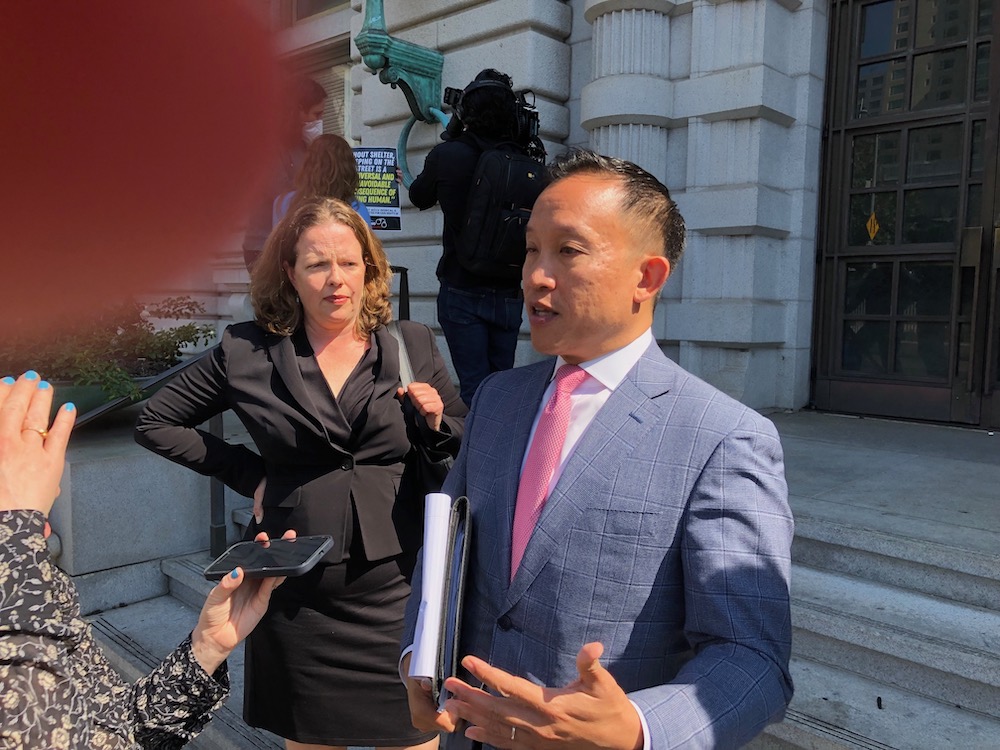City Attorney David Chiu is trying to force the Coalition on Homelessness to accept new terms in its legal injunction banning sweeps of homeless people who have no place else to go.
Chiu filed a notice in court Tuesday arguing that the Coalition had made “admissions” in a court hearing last week that should change the federal Court of Appeals approach to the case.
It all hinges on the definition of “involuntary homelessness” and whether a person who is offered shelter and declines is subject to citation and potentially arrest.

Zal Shroff addresses a rally outside the courthouse
The Coalition argued, successfully, before a federal judge that the city lacks the capacity to house even a small percentage of the city’s homeless population and that many offers of shelter are bogus since those beds just aren’t available.
In fact, according to declarations filed in that case, the city often doesn’t know at the time is makes shelter offers whether there is actually any space in the shelters.
So, the Coalition says, calling someone “voluntarily homeless” if the city makes an offer of shelter and that person refuses lacks any basis in reality.

City Attorney David Chiu is trying to get the courts to allow homeless sweeps again.
(The Coalition isn’t making this argument in court, but I will: The city shelters don’t work for a lot of people, especially couples, who are often separated, people who have compromised immune systems—the shelters are giant congregate settings where Covid and other airborne diseases can spread—and people who have pets, which are not allowed in shelters. Also, since the shelters allow no alcohol or drugs, people with addictions are in effect forced into painful involuntary withdrawal with no medical support or assistance.)
Chiu told the court that during oral arguments in the injunction appeal the lawyer for the Coalition, Joseph Lee:
—Agreed with Judge Desai that “the city can still enforce the enjoined laws against individuals who refuse an offer of actual available shelter” and stated, “If an individual is no longer involuntarily homeless because they have access to practically available shelter, then – again, consistent with Martin and Grants Pass – that individual . . . is no longer involuntarily homeless and, therefore, is subject – is outside the scope of the injunction”;
—Stated that when a person receives an offer of “practically available shelter, then they are no longer involuntarily homeless,” and agreed with Judge Koh that “it doesn’t matter that [the offer] was in the context of an enforcement action”;
—Agreed with Judge Koh that “the actual scope of the injunction only relates to involuntary homelessness without any connection to the formula”; and
—Agreed with Judge Bumatay and stated that “the Eighth Amendment and Martin and Grants Pass doesn’t dictate to any city how they should manage their shelter system.”
He asked the parties to stipulate to those points so the city can begin doing sweeps again.
But Zal Shroff, acting legal director at the Lawyers Committee for Civil Rights, called the filing “yet another attempt at political theatre.
In a statement, he noted:
As plaintiffs made clear at the hearing, there has never been any confusion with the Ninth Circuit’s clear holdings—unhoused individuals who have realistic access to shelter are not involuntarily homeless. Plaintiffs were perfectly willing to stipulate to that effect and remain willing to do so. The city’s misguided filing insists on a charade that the city makes valid shelter ‘offers’ to unhoused individuals when the city itself doesn’t know if any shelter will become available on a given day when it continues to threaten the enforcement of laws enjoined by the district court’s injunction. We should expect better from our political leaders.
In a letter to the Court, Lee wrote:
As the city’s submission shows, Appellees were, and remain, willing to present the Court with a straightforward stipulation reflecting our agreement as to the definition of “involuntarily homeless,” which is the term the city claimed not to understand, and which occasioned the Court’s suggestion that the parties stipulate. We already submitted such a straightforward proposal, which explicitly allows enforcement against an individual who “has a specific offer of realistically available shelter but chooses not to use it.” We believe that the other issues the city sought to introduce into a stipulation were extraneous to the Court’s suggestion, and were not agreed to by the parties. We remain willing to continue discussing a potential stipulation with the city.
Note the language here: “A specific offer of realistically available shelter.”
One of the reasons the federal judge, Donna Ryu, issued an injunction barring the city from conducting sweeps and criminalizing homeless people is that the city’s offers of shelter were not specific or realistic.
That situation hasn’t changed; the waiting list for shelter is now at 400, so for the city to offer a bed to someone in an encampment, city officials either have to allow that person to cut the line, or kick someone else out of shelter. There’s just no room.
But the filing by Chiu shows that the Mayor’s Office desperately wants to get back to the sweeps.



